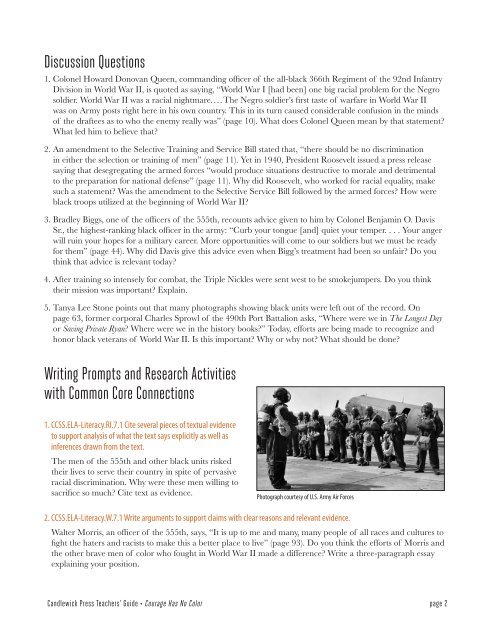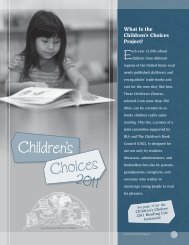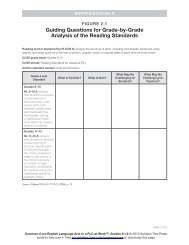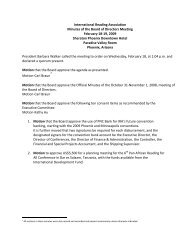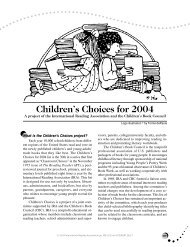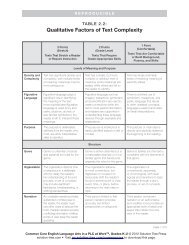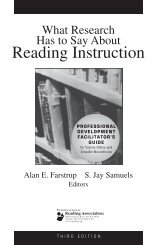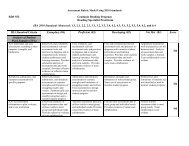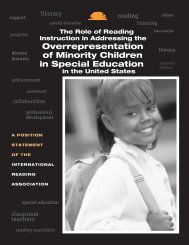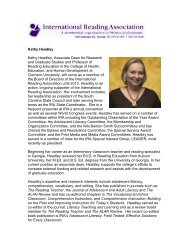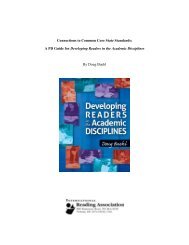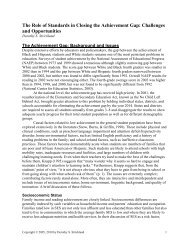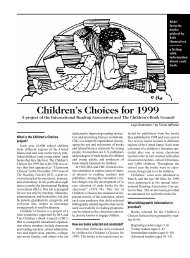Candlewick Press Teachers' Guide ⢠Courage Has No Color
Candlewick Press Teachers' Guide ⢠Courage Has No Color
Candlewick Press Teachers' Guide ⢠Courage Has No Color
Create successful ePaper yourself
Turn your PDF publications into a flip-book with our unique Google optimized e-Paper software.
Discussion Questions<br />
1. Colonel Howard Donovan Queen, commanding officer of the all-black 366th Regiment of the 92nd Infantry<br />
Division in World War II, is quoted as saying, “World War I [had been] one big racial problem for the Negro<br />
soldier. World War II was a racial nightmare. . . . The Negro soldier’s first taste of warfare in World War II<br />
was on Army posts right here in his own country. This in its turn caused considerable confusion in the minds<br />
of the draftees as to who the enemy really was” (page 10). What does Colonel Queen mean by that statement?<br />
What led him to believe that?<br />
2. An amendment to the Selective Training and Service Bill stated that, “there should be no discrimination<br />
in either the selection or training of men” (page 11). Yet in 1940, President Roosevelt issued a press release<br />
saying that desegregating the armed forces “would produce situations destructive to morale and detrimental<br />
to the preparation for national defense” (page 11). Why did Roosevelt, who worked for racial equality, make<br />
such a statement? Was the amendment to the Selective Service Bill followed by the armed forces? How were<br />
black troops utilized at the beginning of World War II?<br />
3. Bradley Biggs, one of the officers of the 555th, recounts advice given to him by Colonel Benjamin O. Davis<br />
Sr., the highest-ranking black officer in the army: “Curb your tongue [and] quiet your temper. . . . Your anger<br />
will ruin your hopes for a military career. More opportunities will come to our soldiers but we must be ready<br />
for them” (page 44). Why did Davis give this advice even when Bigg’s treatment had been so unfair? Do you<br />
think that advice is relevant today?<br />
4. After training so intensely for combat, the Triple Nickles were sent west to be smokejumpers. Do you think<br />
their mission was important? Explain.<br />
5. Tanya Lee Stone points out that many photographs showing black units were left out of the record. On<br />
page 63, former corporal Charles Sprowl of the 490th Port Battalion asks, “Where were we in The Longest Day<br />
or Saving Private Ryan? Where were we in the history books?” Today, efforts are being made to recognize and<br />
honor black veterans of World War II. Is this important? Why or why not? What should be done?<br />
Writing Prompts and Research Activities<br />
with Common Core Connections<br />
1. CCSS.ELA-Literacy.RI.7.1 Cite several pieces of textual evidence<br />
to support analysis of what the text says explicitly as well as<br />
inferences drawn from the text.<br />
The men of the 555th and other black units risked<br />
their lives to serve their country in spite of pervasive<br />
racial discrimination. Why were these men willing to<br />
sacrifice so much? Cite text as evidence.<br />
Photograph courtesy of U.S. Army Air Forces<br />
2. CCSS.ELA-Literacy.W.7.1 Write arguments to support claims with clear reasons and relevant evidence.<br />
Walter Morris, an officer of the 555th, says, “It is up to me and many, many people of all races and cultures to<br />
fight the haters and racists to make this a better place to live” (page 93). Do you think the efforts of Morris and<br />
the other brave men of color who fought in World War II made a difference? Write a three-paragraph essay<br />
explaining your position.<br />
<strong>Candlewick</strong> <strong>Press</strong> Teachers’ <strong>Guide</strong> • <strong>Courage</strong> <strong>Has</strong> <strong>No</strong> <strong>Color</strong> page 2


